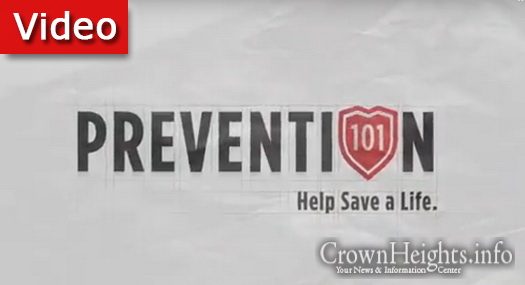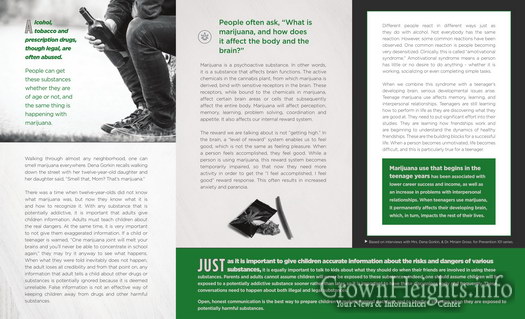
Prevention101: Does the Legalization of Marijuana Make It Safe?
Alcohol, tobacco and prescription drugs, though legal, are often abused. People can get these substances whether they are of age or not, and the same thing is happening with marijuana. Walking through almost any neighborhood, one can smell marijuana everywhere. Dena Gorkin recalls walking down the street with her twelve-year-old daughter and her daughter said, “Smell that, Mom? That’s marijuana.”
There was a time when twelve-year-olds did not know what marijuana was, but now they know what it is and how to recognize it. With any substance that is potentially addictive, it is important that adults give children information. Adults must teach children about the real dangers. At the same time, it is very important to not give them exaggerated information. If a child or teenager is warned, “One marijuana joint will melt your brains and you’ll never be able to concentrate in school again,” they may try it anyway to see what happens. When what they were told inevitably does not happen, the adult loses all credibility and from that point on, any information that adult tells a child about other drugs or substances is potentially ignored because it is deemed unreliable. False information is not an effective way of keeping children away from drugs and other harmful substances.
People often ask, “What is marijuana, and how does it affect the body and the brain?” Marijuana is a psychoactive substance. In other words, it is a substance that affects brain functions. The active chemicals in the cannabis plant, from which marijuana is derived, bind with sensitive receptors in the brain. These receptors, while bound to the chemicals in marijuana, affect certain brain areas or cells that subsequently affect the entire body. Marijuana will affect perception, memory, learning, problem solving, coordination and appetite. It also affects our internal reward system.
The reward we are talking about is not “getting high.” In the brain, a “level of reward” system enables us to feel good, which is not the same as feeling pleasure. When a person feels accomplished, they feel good. While a person is using marijuana, this reward system becomes temporarily impaired, so that now they need more activity in order to get the “I feel accomplished, I feel good” reward response. This often results in increased anxiety and paranoia.
Different people react in different ways just as they do with alcohol. Not everybody has the same reaction. However, some common reactions have been observed. One common reaction is people becoming very desensitized. Clinically, this is called “amotivational syndrome.” Amotivational syndrome means a person has little or no desire to do anything – whether it is working, socializing or even completing simple tasks.
Dr. Miriam Gross explain that when we combine this syndrome with a teenager’s developing brain, serious developmental issues arise. Teenage marijuana use affects memory, learning, and interpersonal relationships. Teenagers are still learning how to perform in life as they are discovering what they are good at. They need to put significant effort into their studies. They are learning how friendships work and are beginning to understand the dynamics of healthy friendships. These are the building blocks for a successful life. When a person becomes unmotivated, life becomes difficult, and this is particularly true for a teenager.
Marijuana use that begins in the teenage years has been associated with lower career success and income, as well as an increase in problems with interpersonal relationships. When teenagers use marijuana, it permanently affects their developing brain, which, in turn, impacts the rest of their lives.
Just as it is important to give children accurate information about the risks and dangers of various substances, it is equally important to talk to kids about what they should do when their friends are involved in using these substances. Parents and adults cannot assume children will never be exposed to these substances. Indeed, one should assume children will be exposed to a potentially addictive substance sooner rather than later, so it is important to have these discussions early and frequently. These conversations need to happen about both illegal and legal substances.
Open, honest communication is the best way to prepare children to make informed decisions and to handle a situation when they are exposed to potentially harmful substances.
(Article is based on interviews with Dena Gorkin and Dr. Miriam Gross.)

















